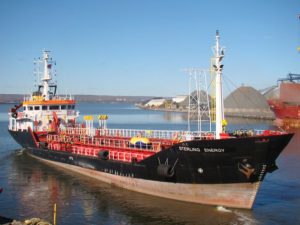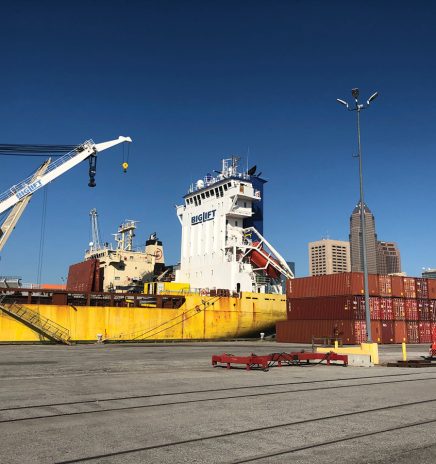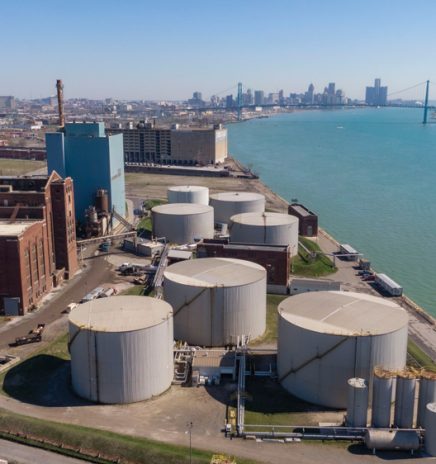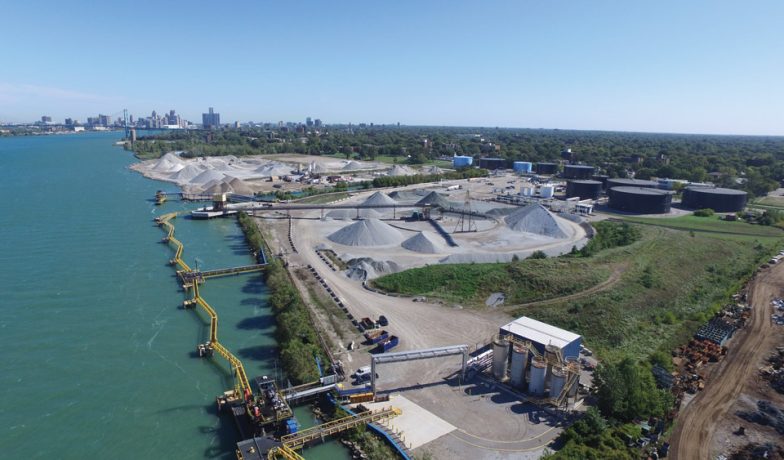Longtime Great Lakes Fuel Supplier Poised To Meet Future Demands
In 2010, Sterling Fuels invested $40 million in its Windsor facility. Then, in 2013, Sterling acquired Provmar Fuels, which added, not only its Hamilton facility on Lake Ontario near Toronto, but also the tanker Sterling Energy. Just a year later, Sterling entered into an exclusive contract with Canadian refiner Imperial Oil to supply marine fuels at its refinery in Sarnia.
Each of those locations is distinctive and strategic, said Adrian Mitterhuber, vice president of Sterling Fuels.
“In Windsor, Sterling offers a ‘one stop shop’ for its customers’ vessels,” Mitterhuber said. “While taking on bunkers, vessels can perform several ancillary operations, such as sludge and domestic waste removal, crew changes, have contractors join or leave the vessel, take on parts and provisions and be supplied with Exxon Mobil bulk, packaged and specialty lubricants.”
Windsor offers both marine diesel oil (MDO) and marine biofuels via pipeline at its dock.
At its Hamilton location, Sterling Fuels offers the sale and delivery of intermediate fuel oil (IFO) and MDO, with the Sterling Energy home-ported there.
“The Sterling Energy is the busiest vessel in the port,” Mitterhuber said. “Our vessel delivers bunkers to vessels when they are working cargo or at anchor, thus eliminating the need for vessels to stop for bunkers elsewhere. This not only saves the vessel time, but improves the vessel’s carbon footprint.”
At Sarnia, Sterling’s operations are focused on bunkering, with limited ancillary services available to customers. Marine diesel fuels are delivered via pipeline at the fuel dock.
“The location at Sarnia is the last bunkering option for vessels heading up-bound to Lake Huron,” Mitterhuber said. “Sterling’s three strategic locations provide excellent options for vessel operators to consider when making bunkering decisions for their vessels.”
Changing Demands

Over the years, Sterling Fuels—much like every maritime company at work on the Great Lakes-St. Lawrence Seaway—has had to be flexible and innovative to meet changing regulations and customer needs. Specific to the fuel supply business, the past 30 years has seen numerous vessels repowered with more fuel efficient engines, along with smaller, older vessels retired in favor of larger ships. Mitterhuber said that, while Sterling’s total tonnage sales now reflect a more fuel efficient fleet, the company’s market share has remained stable. In addition, carbon emission reduction targets set by the International Maritime Organization (IMO) and the Canadian government have shifted fuel demand to lower sulphur content.
“As the Canadian limits on sulphur were reduced annually, Sterling purchased lower sulphur bunkers and blended these fuels to meet the changing demands of the industry,” Mitterhuber said. “Since IMO 2020, there has certainly been a trend from IFO to MDO, with MDO the primary fuel being supplied to vessels today.”
Alternative Solutions
And Sterling is already looking beyond conventional petroleum-based fuel blends for its supply operations. Mitterhuber said the company is fully aware of and ready to pivot to future or “alternative” fuels that will power ships on the Great Lakes.
“As the marine fuel industry looks to alternative solutions to reduce the carbon footprint through products such as methanol, blue and green ammonia, LNG and even green hydrogen, we are evaluating these emerging alternative fuels to determine how we might participate in these spaces,” Mitterhuber said, “or even if they are viable or likely to be globally adopted.”
Mitterhuber, though, argued that a viable, low-carbon alternative fuel is already available, applicable to existing engines, and bunkered at Sterling’s Windsor facility: biodiesel.
“Biofuels provide a reduction in the carbon footprint of vessels in the marine sector,” he said. “Sterling sees this as an important solution to address the industry’s need to meet pending carbon footprint reduction targets. Biodiesel is a drop-in fuel, meaning that little, if any, alterations are needed on board to switch to using biodiesel. As interest and demand grows, Sterling is poised to be on the forefront as a reliable biodiesel marine fuel supplier on the Great Lakes.”
Partnership with CCG
In October, Sterling Fuels signed a contract with the Canadian Coast Guard (CCG) to supply a 20 percent biodiesel blend for the CCG vessel Caribou Isle. In the days ahead, CCG and Sterling will test a variety of biodiesel ratios to see how higher blend rates function in different operational settings. Along with the biodiesel test project, CCG also announced it will build a hybrid electric Near-Shore Fishery Research Vessel (NSFRV). CCG is currently seeking proposals from Canadian shipbuilders.
“The Canadian Coast Guard is taking significant steps in reducing its carbon footprint with these two initiatives,” said Joyce Murray, Minister of Fisheries, Oceans and the Canadian Coast Guard. “I’m looking forward to expanding these green initiatives, which will chart a positive course toward a cleaner, low-carbon environment from coast-to-coast-to-coast.”
Mitterhuber said the Canadian Coast Guard project is just one of several biofuel-related partnerships Sterling is involved in.
“Three years ago, Sterling entered a supply partnership with one of its customers by supplying biodiesel marine fuel,” he said. “This started and remains a trial, but from all accounts has been very successful. More recently, Sterling is supplying biofuels to another customer that operates three fleets on the Great Lakes. Subject to a successful trial, they intend to switch the majority of their fleet to marine biofuel on a go-forward basis.”
Mitterhuber said other customers have also expressed an interest in biofuels, and he expects further deployment to begin next year. So far, he said, biofuel use in the Great Lakes has been limited to the warmer months from April to November, but he expects trials to test its use even in the coldest winter months.
“The beauty of biodiesel is that it is relatively easy to switch from marine diesel and back to bio marine fuels on board vessels,” he said. “We have the capability of providing our customers with various blends of biodiesel, so we can mix the biofuel with marine diesel to meet our customers’ needs.”
Mitterhuber said, now as in 1993, the attitude at Sterling Fuels is to be responsive to market conditions, customer needs and regulations.
“We believe that our future is bright,” he said. “Our team is poised for the new challenges ahead. We have demonstrated our ability to be nimble and meet the challenges of changing regulations and changing demands in the marine bunkering industry.”

ICCT Releases Report On Alt-Fuel Study
Benefits and Barriers The International Council on Clean Transportation (ICCT) recently released the findings of a study focused on alternative fuels for the Great Lakes shipping industry. The U.S. Maritime... Read More

Warner Petroleum Bringing Biodiesel to the Great Lakes
Environmentally Friendly Biodiesel Supports Sustainable Shipping As a major fuel supplier to the Great Lakes, Michigan-based Warner Petroleum is poised to have a major impact on sustainable maritime shipping by... Read More



